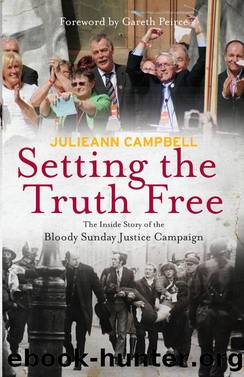Setting the Truth Free by Julieann Campbell

Author:Julieann Campbell [Campbell, Julieann]
Language: eng
Format: epub
Tags: History, General, Europe, Ireland, Political Science
ISBN: 9781907593949
Google: 5K58AwAAQBAJ
Publisher: Liberties Press
Published: 2013-02-25T16:08:29+00:00
South of the border, the mainstream media were beginning to move into alignment with the campaignâs perspective. A Sunday Tribune editorial on 25 March 1997 branded British troops on Bloody Sunday as âa gang of murdering thugsâ.
In May, Labour leader Tony Blair succeeded John Major as British prime minister. Almost immediately, pressure was put on him to begin to resolve the Bloody Sunday issue. At the time, there was a noticeable thaw in British-Irish relations. A meaningful peace process loomed. In the following months, Sinn Féin would be brought into all-party talks at Stormont. The Good Friday Agreement would be signed a year later.
Embroiled in the peace negotiations, Martin McGuinness â later to become Northern Irelandâs deputy first minister â frequently travelled to see Blair at Chequers. He reveals that Bloody Sunday often slipped into the conversation.
âBloody Sunday came up in quite a number of conversations,â McGuinness says. âGerry Adams and I would travel over to London without the media knowing and then on down to Chequers and meet Tony Blair there. We had many soul-searching conversations about the conflict in Northern Ireland and spoke openly of Bloody Sunday.â
Days after Blair was appointed prime minister, Derry MP John Hume tabled a second Early Day Motion in the Commons urging the new prime minister to ârecognise that, having a full examination of all the relevant evidence, including the armyâs radio traffic, the fresh medical evidence and unexamined written statements of witnesses, is the best way to exorcise the bitter memories of twenty-five yearsâ.
âThe aimâ, he explained at the time, is to get this Government to take the step towards truth which its predecessor resisted. I believe the truth matters to Tony Blair. I also know that without the truth there can be no honest reconciliation or meaningful healing.â
Back in Derry, the campaign demanded that the Labour governmentâs approach to the issue had to be âradically differentâ from the previous Tory administrationâs.
Throughout this period, the families were kept abreast of progress by Hume and McGuinness: âThe British were already floating the possibility of a formal apology,â Tony Doherty remembers. âBut by then we were getting regular access to the airwaves and we made it clear on numerous occasions through radio, TV and newspapers that an apology would not be acceptable and would make matters worse. An apology would be appropriate only after we got the truth.â
âWhat we were talking about was having to undo an aspect of history which was morally, politically and judicially wrong and had caused great hurt to Irish people over decades. It was an aspect of history that remained an obstacle in terms of the peace process and everyone knew the positive effect that a successful resolution of Bloody Sunday would have on that process.â
As the summer of 1997 drew nearer, Eamonn McKee and Gerry Cribbin finalised the Irish governmentâs assessment of the new evidence. Don Mullan was given the opportunity to preview it before completion.
âI was invited to the Department of Foreign Affairs to read through the penultimate draft of the document,â Don recalls.
Download
This site does not store any files on its server. We only index and link to content provided by other sites. Please contact the content providers to delete copyright contents if any and email us, we'll remove relevant links or contents immediately.
Women and Jewish Marriage Negotiations in Early Modern Italy by Howard Tzvi Adelman(462)
Warrior King by Wilbur Smith(425)
The Battle of Austerlitz by 50minutes(317)
18 real-life stories of serial killers and murderers with solved and unsolved killings from the USA, UK, Europe, and beyond. by Ben Oakley(313)
Youth, Heroism and War Propaganda: Britain and the Young Maritime Hero, 1745â1820 by D. A. B. Ronald(307)
Violence and Emotions in Early Modern Europe by Susan Broomhall;Sarah Finn;(305)
Who's Who in the Zulu War, 1879: The British by Adrian Greaves Ian Knight(303)
The American Crisis by Unknown(298)
The Seeker by S. G. MacLean(253)
The Origins of French Absolutism, 1598-1661 by Alan James(247)
The Dutch East India Company and British East India Company: The History and Legacy of the Worldâs Most Famous Colonial Trade Companies by Charles River Editors(240)
The Traitor of Colditz by Robert Verkaik(235)
The Thirty Years War â Complete by Friedrich Schiller(228)
A Genius for Confusion by Richard M. Fried(224)
Fires of Faith by Catholic England under Mary Tudor(224)
Interest and Connection in the Eighteenth Century by Jacob Sider Jost(222)
Invisible Worlds by Peter Marshall(220)
The Slave Trade in Africa by Simon Webb;(220)
The Opium Wars: Exploring the Addiction of Empires from Beginning to End by Ramos Adrian & Compacted History(217)
